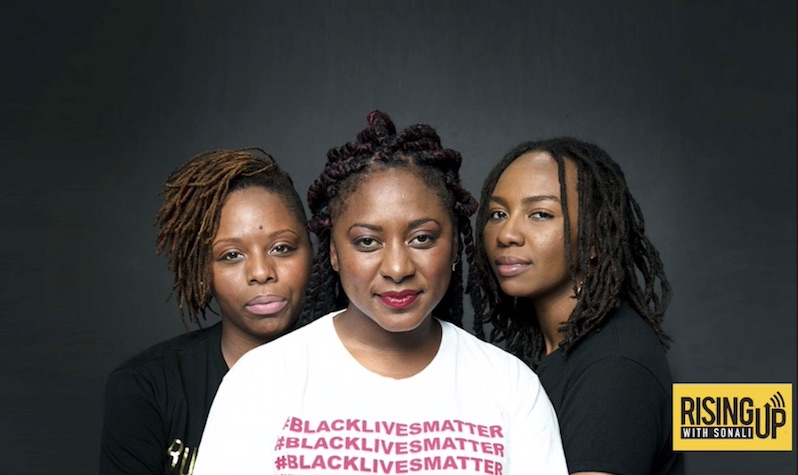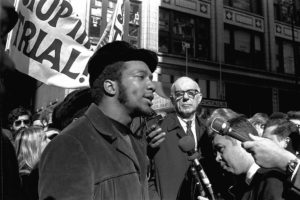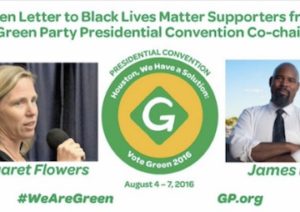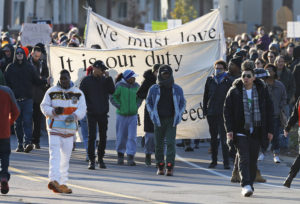Black Lives Matter Co-Founder Alicia Garza Reflects on the Movement’s First Three Years
The activist talks about what has changed—and what hasn't—on this third anniversary of the birth of the nation's most important contemporary struggle for social and political justice. Alicia Garza, flanked by Patrise Cullors, left, and Opall Tometi. (Video still from "Rising Up With Sonali")
1
2
Alicia Garza, flanked by Patrise Cullors, left, and Opall Tometi. (Video still from "Rising Up With Sonali")
1
2
BLM’s focus is not restricted to problems of policing. Police violence is the most dramatic representation of state violence against black communities, but there are myriad other connected issues. Oakland, where Garza is based, is a historically black city and has a rich and storied background of militant black activism, especially as the birthplace of the Black Panther Party. But in recent years Silicon Valley’s tech industry workers have left expensive San Francisco looking for cheaper rents and turned Oakland into the site of a war over gentrification. Garza sees the problems of policing, gentrification, poverty and unemployment as intimately linked. “You can’t separate police violence from gentrification because police violence and policing is often used to bolster those processes,” said Garza, who has worked in the San Francisco Bay Area on this issue for more than a decade.
Ironically, many tech workers see themselves as liberal or libertarian and even embrace the ideals of BLM in a theoretical sense. Facebook founder Mark Zuckerberg famously scolded his employees publicly for crossing out the phrase “Black Lives Matter” on company walls and replacing it with “All Lives Matter.” But Garza is concerned that “there is a dissonance” between stated values and actual actions within the Bay Area-based tech industry.
In San Francisco she found that “there was lots of talk around social justice and fairness but yet there was almost a separate and unequal way of engaging with the community that tech was really pushing.” For example, to get around San Francisco’s failing public transportation system, tech companies simply started private bus systems, using public infrastructure, for their employees. This blindness to the plight of vulnerable populations is a microcosm of the American white supremacist culture that BLM has been battling.
Today, thanks to the resonance of Black Lives Matter, Garza, Cullors and Tometi enjoy much greater spheres of influence than before. I asked Garza whether the glare of the public spotlight has helped or hurt her activism. As she had done throughout our conversation, she gave a nuanced and deeply insightful answer: “It helps us get our message out to more people than already agree with us.” But, she added, “I think people can confuse visibility with power. The reality is the conditions in our community are not that different [from before].”
BLM has blossomed into a serious political movement through the activism of the black community, some of whose members are new to organizing. Now, it is up to the rest of us to expand on the work of the past three years—to move beyond cultural shift into real transformation, so that with visibility comes power to make black lives really matter.
Watch Kolhatkar’s interview with Garza below (“Rising Up With Sonali” via Vimeo)
SUPPORT TRUTHDIG
Conversation With Black Lives Matter Co-Founder Alicia Garza on 3rd Anniversary of Movement from Rising Up With Sonali on Vimeo.
Your support matters…Independent journalism is under threat and overshadowed by heavily funded mainstream media.
You can help level the playing field. Become a member.
Your tax-deductible contribution keeps us digging beneath the headlines to give you thought-provoking, investigative reporting and analysis that unearths what's really happening- without compromise.
Give today to support our courageous, independent journalists.



You need to be a supporter to comment.
There are currently no responses to this article.
Be the first to respond.